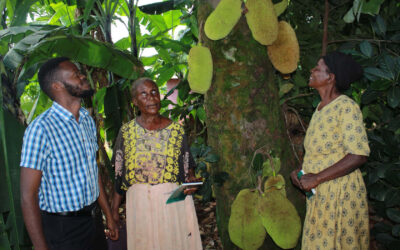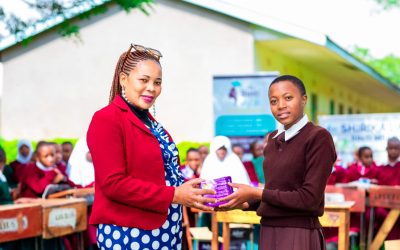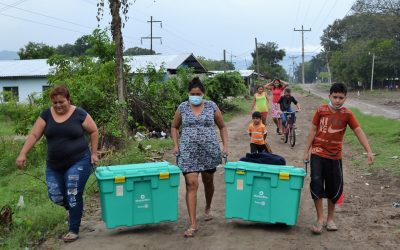Rotary International President, Mark Maloney and his wife Gay, cancelled the remainder of their trip around Europe because of the coronavirus threat.
After a five-day stay in London, the couple had been due to fly onto Switzerland.
In a Facebook post, Gay Maloney wrote: “The complications of international travel with restrictions imposed due to the coronavirus virus resulted in the difficult decision for Mark and me to suspend our Rotary travel and to fly from London, England, to Rotary headquarters in Evanston, Illinois.
“We look forward to resuming Rotary travel as soon as possible. Our thoughts and prayers are with everyone at this challenging time.”
https://www.facebook.com/photo.php?fbid=219887425825586&set=p.219887425825586&type=3&theater
The decision was made the day after US President, Donald Trump, banned all visitors from the European Union’s Schengen area to enter the United States.
Mark and Gay Maloney had been due to head to Switzerland to attend a benefit concert in Lucerne, and meet the Prime Minister of Liechtenstein, Adrian Hasler, before visiting Kosovo, Albania, Greece, Luxembourg, and Turkey, where they were due to visit a refugee camp hosting Syrian refugees with a Rotary Global Grant.
A planned Rotary Presidential Peace conference at UNESCO in Paris on March 28th to commemorate the 75th anniversary of the signing of the United Nations charter and Rotary’s relationship with the UN, has also been cancelled. This was to have been the last leg of the trip for the Rotary International President.
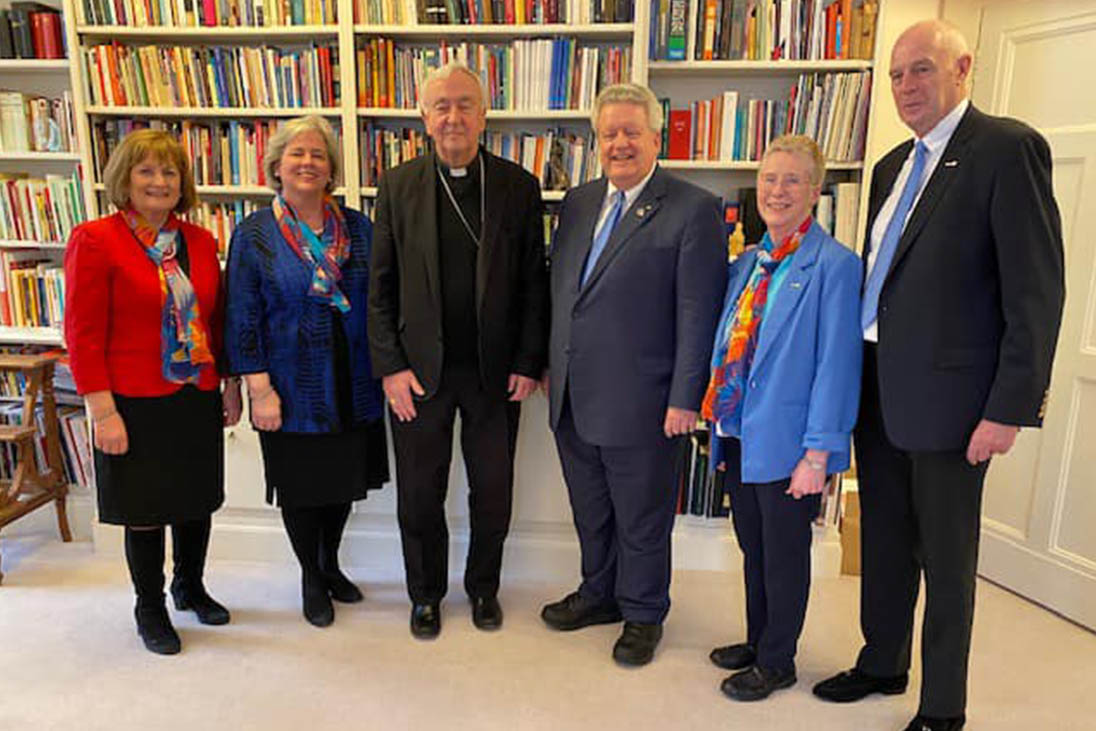

Rotary International President, Mark Maloney and his wife Gay, cancelled the remainder of their trip around Europe because of the coronavirus threat.
The couple also have a planned audience scheduled with the Pope at the Vatican on May 7th, but this may now be in doubt.
Speaking before leaving for the United States, Mark Maloney paid tribute to the work going on in Great Britain and Ireland.
He pointed out how Rotary has a great history in Great Britain and Ireland, the first to be established outside of North America in 1912.
“Rotary is still doing great work in the country, however we have seen a decline in membership in Great Britain & Ireland, just as we have seen in North America and elsewhere,” said Mark.
“We are seeing an ageing of the membership here. Therefore, it is my opinion that we need to be bold and innovative in how Rotary moves forward in the future.
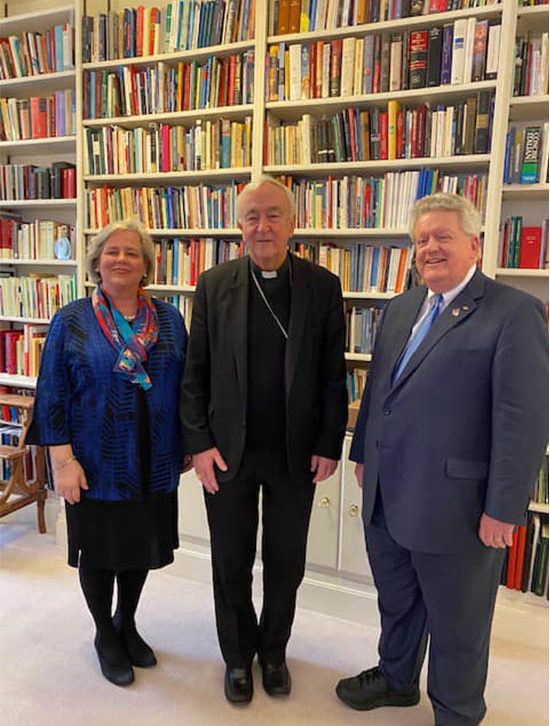

Speaking before leaving for the United States, Mark Maloney paid tribute to the work going on in Great Britain and Ireland.
“Rotary clubs which exist now need to continue on. But we need to be starting new and innovative Rotary clubs which meet in different ways.
“And it is not people like me who need to be deciding how a club ought to be structured. We should be going to the Rotaractors and other young business and professional leaders and ask them: what type of club do you want to belong to?”
The Rotary International President acknowledged that these new clubs would present the organisation in a very different way.
After almost 40 years as a Rotarian, he pointed out that these new clubs may be not be the type of club he would be comfortable with. “But we are not trying to attract ‘me’,” he pointed out.
“We have the clubs which will attract people like me, who are not yet in Rotary.
“But we need to be starting new and innovative clubs in communities where you already have one or two Rotary clubs, which are maybe doing very well and thriving.
“We have got to segment our market, we have got to appeal to many different demographic groups and, therefore, we must have clubs that meet in different ways.
But we need to be starting new and innovative clubs in communities where you already have one or two Rotary clubs, which are maybe doing very well and thriving.”
As Rotary reconfigures itself to meet the modern age, Mark Maloney explained that existing clubs should continue to operate as they feel comfortable. “I’m not saying that they have to change their club,” he explained.
“I think they need to look at how they innovate, but sponsor a satellite club, sponsor a new independent club which meets in a different way.
“Provide an opportunity for those people who want things in a different way.”
Mark highlighted one traditional club in North Carolina with a membership of a dozen over-70s which has started a satellite club for younger people in the community – and which is going well.
“They like their own club, but they have started a satellite club for younger people in the community, realising that eventually they are going to die out and that satellite club is going to become the Rotary club of wherever this is.”
https://www.facebook.com/photo.php?fbid=221601122320883&set=p.221601122320883&type=3&theater
He cited another example of an American Rotary club which was meeting at lunchtime, but which then started a breakfast satellite club.
“It’s going gangbusters,” exclaimed the Rotary President. “So much so that, gradually, all of the members of the existing club which met at a lunchtime, are meeting at breakfast, and that is the club.
“Yes, change is difficult to accomplish, but we are not saying your personal experience has to change. Start a new club which has a different experience, and meets in a different way, and which attracts people who aren’t like you.”
Mark’s wife Gay Maloney, herself a Rotarian, described Rotary as “the ultimate meet-up”. Fellowship is one of Rotary’s core values, yet another way of looking at fellowship was by gathering or connecting, she said.
“Young people I have encountered all over the world through Rotary are eager for connection,” said Gay.
“Rotary is what many of them have been looking for. They are so appreciative to know more about it if they have the opportunity.
“Young people are looking for humanitarian service, Fellowship works in a different way for them, and they want the experience which they can have through humanitarian service.”
Young people I have encountered all over the world through Rotary are eager for connection.”
Husband Mark agreed, lamenting the fact that the mobile phone, far from connecting people, was becoming a separator. Rotary can fill the gap, he suggested.
“The smartphone is not really a connection. It provides people with information and lets them know what other people are doing. But it is a separator.
“How many times have you got in a lift and everyone has got their face buried in the phone? What connection is there with other people in the lift?
“Rotary provides the person to person interaction, that is what connection is all about.
“And Rotary provides people with an opportunity to perform humanitarian service, connecting with other individuals, both professionally, and in terms of friendship and fellowship.”
An example of this was in Zimbabwe, where Mark and Gay had been based prior to their visit to England.
The couple had spent five days helping out at a medical mission in Mutare in the eastern highlands of Zimbabwe, close to the border with Mozambique.
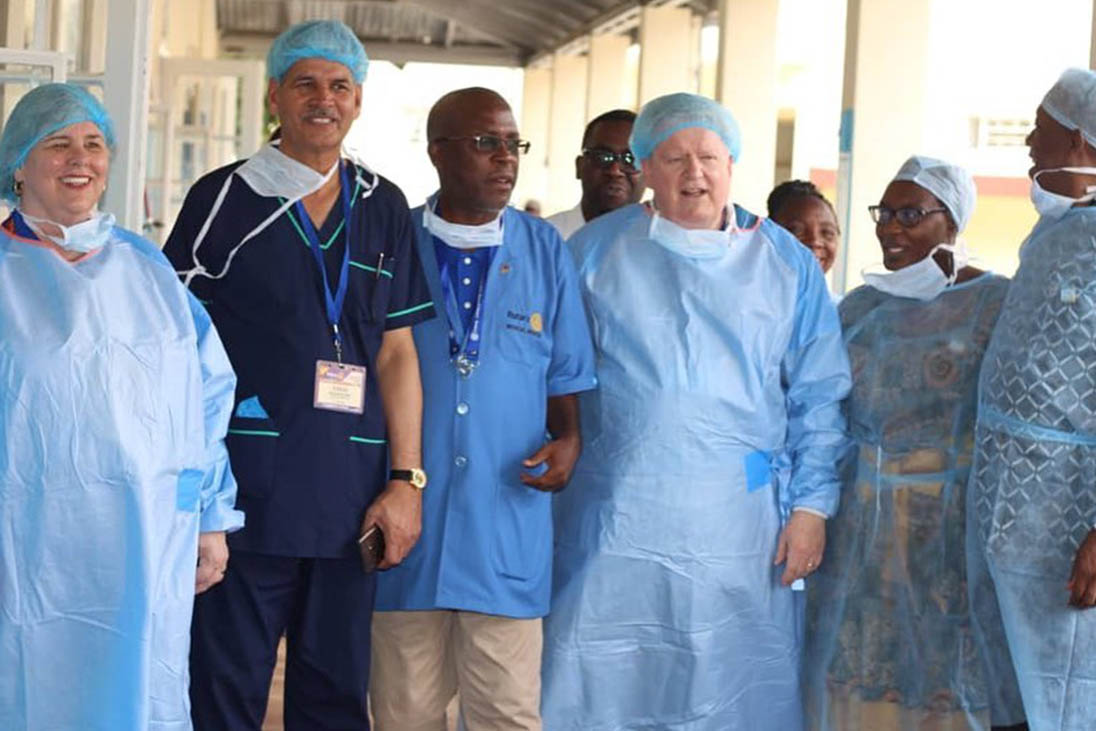

Mark and Gay Maloney spent five days helping out at a medical mission in Mutare in the eastern highlands of Zimbabwe, close to the border with Mozambique.
They were invited by Rajendra Saboo, who was Rotary International President from 1991-92. Since 1998, Raja has led teams of Indian doctors to Africa, performing more than 760,000 surgeries in more than 43 countries.
In Mutare, 20 Indian doctors and 10 Rotary volunteers looked after more than 3,000 patients during the five-day medical mission, which was supported financially by a Rotary Global Grant. They conducted around 1,200 medical procedures and more than 500 major surgeries.
“It was an incredible experience,” said Mark. “The doctors were working in a challenging environment. This was a hospital which had no ventilator, and with limited facilities.
“They had converted an operating theatre which normally has one operation at a time, to host three simultaneously.
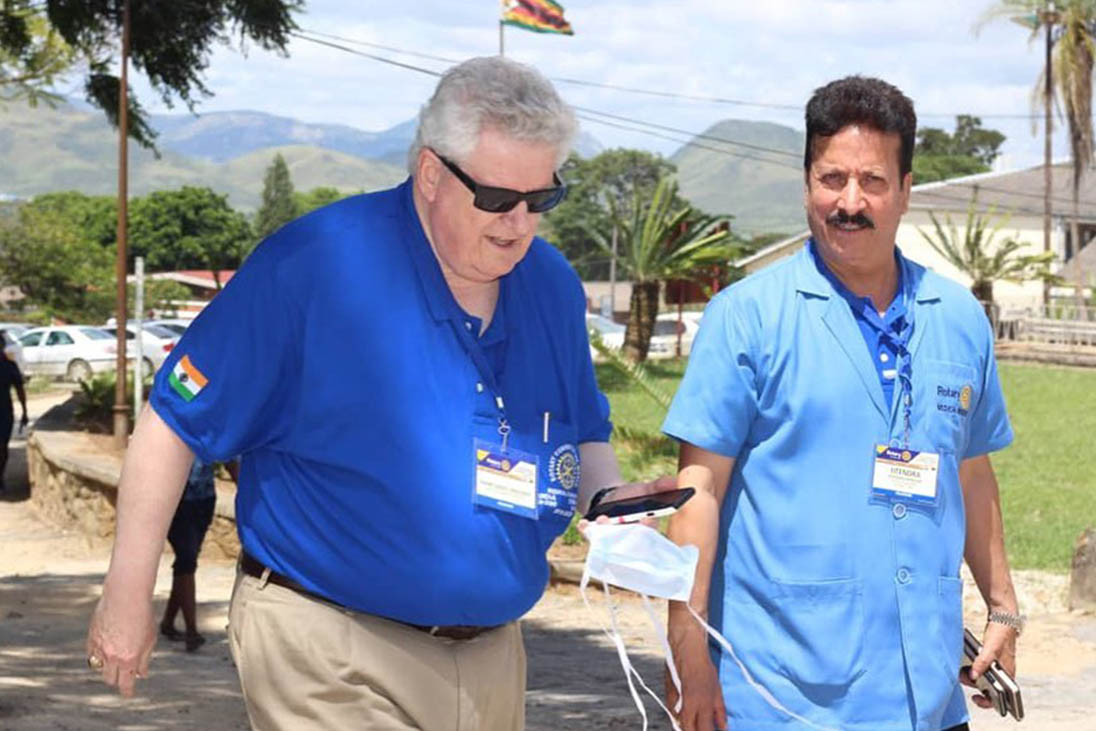

In Mutare, 20 Indian doctors and 10 Rotary volunteers looked after more than 3,000 patients during the five-day medical mission, which was supported financially by a Rotary Global Grant.
“It was remarkable to see what Rotary was accomplishing there. These doctors transformed lives, and that is what Rotary is all about.”
The Indian doctors worked with colleagues from Zimbabwe, helping to train them in different medical procedures. The Indian team also brought special equipment and medicines with them which they left in Zimbabwe in the hope the work would continue.
Both Mark and Gay were hands on, helping patients to the theatre, getting them on and off the operating tables and pushing trolleys.
“What was remarkable was the scope of medical procedures these doctors were performing,” added Gay.
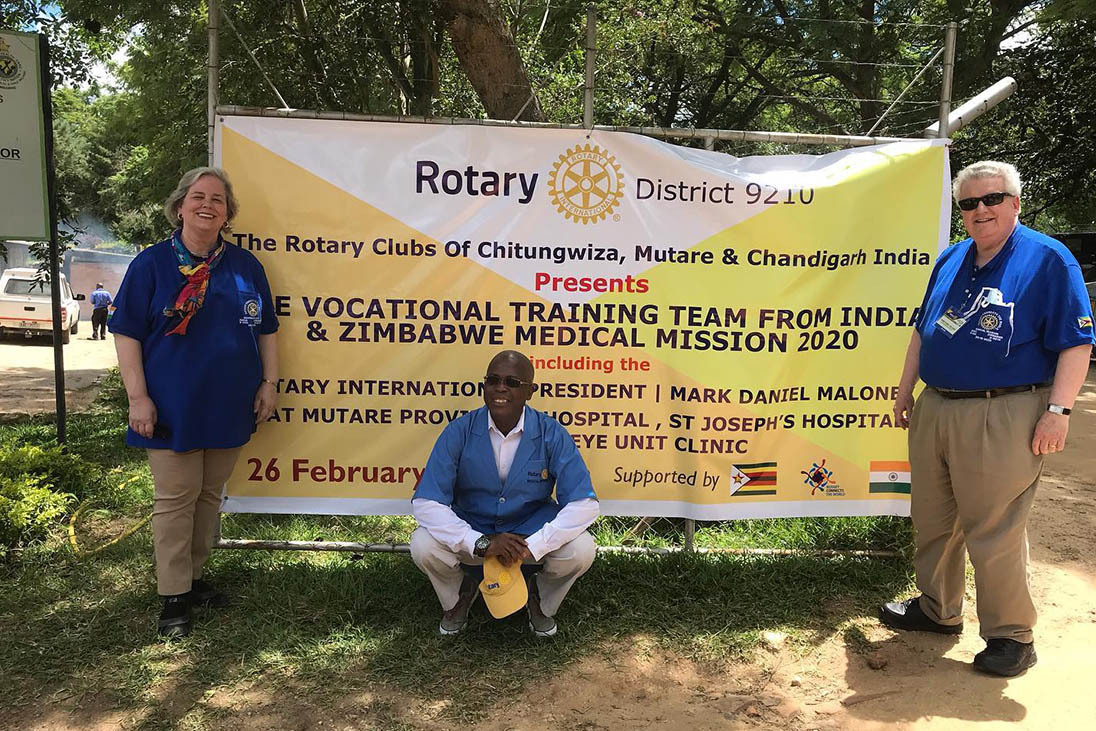

The Indian doctors worked with colleagues from Zimbabwe, helping to train them in different medical procedures. The Indian team also brought special equipment and medicines with them which they left in Zimbabwe in the hope the work would continue.
“In the USA or UK, if you had a growth on your neck, it would be taken off when it was relatively small. But we saw people with growths on their necks the size of an orange or larger.
“One man had the choice of either having cataract surgery to see again or he could have the growth taken off his throat which he’d had for 20 years. But he wanted to be able to see.
“Another woman had a growth the size of a baby taken out of her uterus. This was something she’d had to suffer with for many years because there are no medical choices which are affordable or available.
“These people were so patient and appreciative to suffer through things which we have not had to suffer through for many years.”








